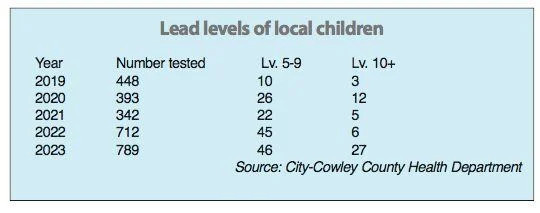From JUDITH ZACCARIA/Cowley CourierTraveler
(Editor’s Note: Reporting for this story was underwritten by a children’s health grant from the Kansas Newspaper Foundation made possible through the Legacy Regional Community Foundation for the use of all media outlets.)
The City-Cowley County Health Department has received a grant of $50,000 to pay for increased lead testing and education over the next six months. The grant came through the National Center for Healthy Homes.
The funds are given as an opportunity to look for lead poisoning in rural communities, said Tom Langer, health department director. The agency applied for the grant six weeks ago and was one of six national entities selected.
Lead poisoning concerns have risen of late after community sessions in 2023 on the poor state of children’s health in Cowley County. Those “data walks” included warning about the high percentage of old homes, which potentially still have lead paint and pipes. Also, more kids are testing for high lead levels since 2019.
The grant came “at exactly the right time,” Langer said. “It will go a long ways toward the cost of testing and materials.”
The health department will now submit a budget and set a date to begin the testing and teaching the public about lead poisoning next month. Meanwhile, they will be looking for other partners to keep the testing and teaching going.
“We’re trying to build something sustainable,” Langer said. “We want to do outreach to schools and daycare providers, remove barriers” to getting kids tested.

Tara Taylor, director of Head Start at USD 470 in Arkansas City, said the grant will be very helpful, especially because the health department can get more resources out to families to educate them about the dangers of lead poisoning. It also can show them how certain common practices such as cleanliness and good nutrition can help keep their children safe.
Lead exposure at any age is problematic, but in developing children small amounts of lead can cause them to appear inattentive, hyperactive or irritable. If children are exposed to higher levels of lead, they may have problems learning and reading, delayed growth or hearing loss. Higher levels of exposure may even lead to death.
Currently all preK children at USD 470 must be tested for lead before they go to school.
The health department plans to use videos, podcasts, information on its website, and in-person presentations to “make residents lead-aware” and homes safe. The goal is to get testing numbers up and positive (for lead) tests going down, Langer said.
With more than 100 years of using lead in house paint and in water pipes, and other ways with which people, especially children, come in contact with it, lead poisoning remains a problem.
“It cannot be forgotten,” he said.


